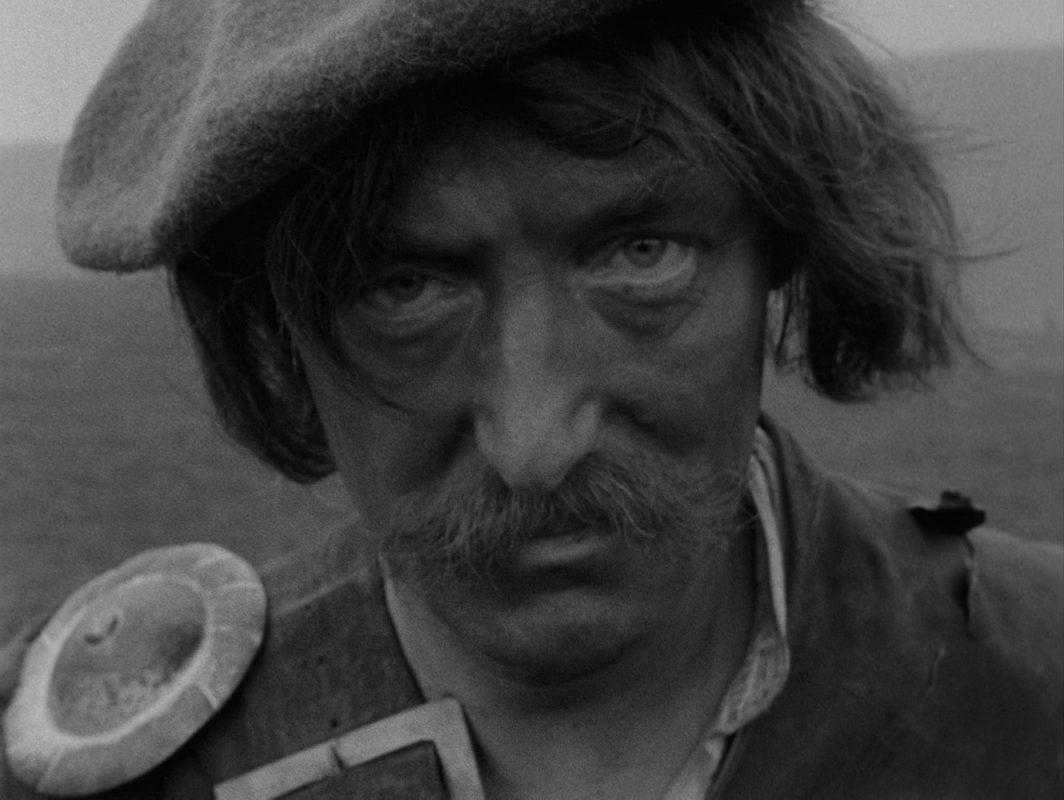“Parfois ils disent que nos images sont esthétiques, mais nous disons que les images esthétiques sont des images hautement étiques. Pour nous éthique et esthétique marchent ensemble. Re-filmer signifie re-signifier.”Prigionieri della guerra [Prisoners of War] (Yervant Gianikian + Angela Ricci Lucchi, 1995)
Apr
24
Armenian genocide

Horse-pulled carts arrive at a cross (via). DPs: Yervant Gianikian & Angela Ricci Lucchi.
A World War I film: a day in recognition of the forced deportations and genocide in Armenia, 1915 — 1923.
– Yervant Gianikian and Angela Ricci Lucchi in conversation with Daniele Dottorini, 2007 (via)
Re-purposed propaganda reels show citizens – displaced, dehumanised – turned into prisoners of war, and finally into corpses.
documentary
“I love to see myself in Technicolor.”Hotel of the Stars (Jon Bang Carlsen, 1981)
Apr
21
Heartbreak Hotel

The setting for a dramatic reenactment, watched over by the King. DP: Alexander Gruszynski.
A film set in a hotel, or involving Elvis Presley, on the date Heartbreak Hotel topped the charts in 1956.
Once home to the stars, Hollywood's crumbling Montecito Hotel is now populated by drug dealers, prostitutes and the Tinseltown hopeful — extras hoping for that big break. They play the bit parts of their own re-enacted lives and dreams – some imagined, some real – whatever that may mean in Hollywood.
L'eclisse del 17 aprile [An Eclipse of the Sun] (1912)
Apr
17
1912

Scientists in impeccable suits observing the 1912 solar eclipse. The colour used for tinting this scene, a turquoise, indicates moonlight/dusk. Image source: Cineteca di Bologna (via).
“I had appealed to the people to fast on April 6, and the whole nation followed my call. Who was I? But it was the voice of God… India was awakened that day.”Vagabunden Karawane [Vagabond’s Band] (Werner Penzel, 1980)
Apr
16
હડતાળ

A member of Embryo plays a harmonium with a bemused साधु [sadhu] sitting behind him (still via). DPs: Pitt Koch & Helge Weindler.
A film set in India in remembrance of Gandhi's હડતાળ [hartal], a peaceful protest against the Jallianwala Bagh Massacre, in the form of a nationwide fast and prayer on April 16, 1919.
– Mahatma Gandhi, via
In 1979, krautrock group Embryo toured Iran, Afghanistan and India by bus, while performing with local musicians and documenting their trip.
“Sir Thomas Sheridan, Jacobite military secretary. Suffering advanced debility and loss of memory. Former military engagement, 56 years ago. Sir John MacDonald, Jacobite captain of cavalry. Aged, frequently intoxicated, described as 'a man of the most limited capacities.' John William O'Sullivan, Jacobite quartermaster general. Described as 'an Irishman whose vanity is superseded only by his lack of wisdom.' Prince Charles Edward Stuart, Jacobite commander in chief. Former military experience: 10 days at a siege at the age of 13.”Culloden (Peter Watkins, 1964)
Apr
16
1746

One of the clansman. The look in his eyes foreshadows the Vietnam War this films comments on. DP: Dick Bush.
– narrator
Το άλλο γράμμα [To allo gramma / The Other Letter] (Lambros Liaropoulos, 1976)
Apr
6
Greece

A woman observing her own reflection (via). DP: Stavros Hassapis.
Something something Greece (or the Olympics) on the date of the 1896 Summer Olympics
Athens seen through words put down in letters, forming a narrative of the city, Greece, its history, and its people.
“All the ideas I'd previously had were shown to be completely false. This was the first time I had really seen the strength and the power of a mass struggle; ordinary people directly participating in organizing their communities, and the defense of their communities.”The Patriot Game (Arthur MacCaig, 1979)
Apr
4
MLK Jr. – 1968

A older lady calmly clips her hedges while a British soldier attempts to hide behind them (via). DPs: Arthur MacCaig & Théo Robichet.
The assassination of Martin Luther King Jr.: civil rights being fought for.
– Arthur MacCaig, title card
“Dear child,
l received your letter and hope you will write often. l hope you won’t stay away too long and that you’ve found a job by now. If you’re doing well, we’re happy. Even though we do miss you. When will you be back? Everything is fine here, but Sylviane is home with the flu. My blood pressure is low. l’m on medication for it. Today is my birthday. l feel sad. lt’s quiet at the shop. Tonight we’re going out to dinner with friends. That’s all. Your birthday is coming up. l wish you all the best. Write to me soon about your work, about New York, about everything. Lots of love from the three of us.News from Home (Chantal Akerman, 1976)
Apr
3
Pony Express Day

New York, a street scene. Superimposed a quote from one Chantal Akerman's mother's letters. DPs: Jim Asbell & Babette Mangolte.
Mail or a mail carrier for Pony Express Day (USA).
Your loving mother” (quote via)
Chantal Akerman reads out letters that her mother wrote to the former's stay in New York City between 1971 and 1973. The words slowly blend with the city.
Moment of Impact (Julia Loktev, 1998)
Apr
1
1989

A person holds Leonid Loktev's head from behind, while someone else cups his left eye with one hand. DP: Julia Loktev.
“This film portrays the traffic war that goes on every day. — Tokyo, 1964”ドキュメント 路上 [Document Rojo / On the Road: The Document] (Noriaki Tsuchimoto, 1964)
Mar
26
Road Traffic Act 1934

A look from a Tokyo cab driver's perspective. We see the dashboard, heavy trucks ahead, and behind, and the reflection of the driver in his rearview mirror. DP: Tatsuo Suzuki.
Bad drivers: the start of compulsory driving tests in the UK was established on March 26, 1934* with the Road Traffic Act.
– opening title
*I find no solid proof to support this statement